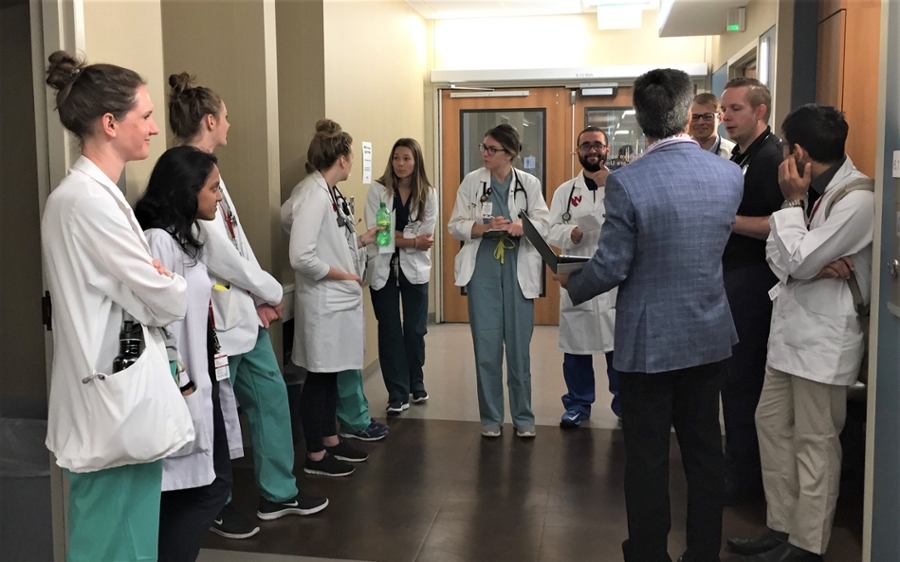Rotations

Our clinical curriculum provides fellows flexibility to focus on career interests while preparing to function as high-quality, independent nephrologists.
Schedule
First-year fellows divide their inpatient time among the three nephrology services: inpatient consult for 15 weeks, transplant for 14 weeks, and VA for 14 weeks. Other focused time: outpatient for four weeks, vacation for four weeks, National Kidney Foundation Meeting with costs paid for one week.
Fellows attend an outpatient longitudinal nephrology continuity clinic and participate in an educational curriculum, including didactic sessions, hands-on experiential workshops, and interactive conferences.
Fellows spend six months rotating through the three inpatient services and then have six months of elective time, designed to align with the interests of the fellow. Fellows also participate in an outpatient longitudinal dialysis curriculum training to manage outpatient dialysis patients. Trainees will also learn to manage home hemodialysis and peritoneal dialysis patients. Fellows continue the half day per week continuity clinic.
Elective time is routinely used to design and conduct clinical research projects, QI projects, or other scholarly activities. Recent fellows have developed expertise in interventional nephrology and achieved procedural certification. Other options: clinical emphasis in transplantation, critical care, home dialysis, hypertension, renal pathology, or other career interests.
A typical second year schedule: Consult service for nine weeks, transplant service for nine weeks, VA service for eight weeks; elective/outpatient for 20 weeks, four weeks of vacation, ASN meeting for one week, and home dialysis training for one week.
Core Consult Inpatient Rotation
Through UNMC's primary clinical partner, Nebraska Medicine, our fellows participate in our core consult service, which provides inpatient consultative nephrology to all non-transplant patients.
This rotation provides a rich exposure to management of critical care patients with such renal issues as, acute kidney injury, fluid and electrolyte disorders, hemodialysis-related complications, glomerulonephritis, and dialysis including continuous renal replacement therapy.
In addition to a nephrology faculty and a nephrology fellow, there are typically three or four internal medicine residents rotating through this service. The fellows and residents divide the work of the service, which allows the fellow to develop experience in a supervisory role.
The fellow typically sees 8 to 12 patients on their own, and the remainder of the patients are seen by the residents under the supervision of the fellow. Medical students and observers often rotate on this service as well, and fellows have the opportunity to play an active role in student education.
Transplant Rotation
Typically, 140 to 170 patients per year receive transplants through Nebraska Medicine’s nationally renowned kidney and kidney-pancreas transplant program, with some traveling from across the United States. Our team provides longitudinal care for more than 1,200 patients, affording fellows exposure to both acute and long-term issues in kidney transplantation.
The Nebraska Medicine transplant center frequently employs innovative strategies to living kidney transplantation including the use of kidney paired donation and transplant chains. The kidney transplant service includes a transplant faculty member, a general nephrology fellow, a transplant advanced practice provider, as well as other multidisciplinary team members. The inpatient census averages approximately 10 patients.
Fellows work in a kidney transplant clinic on short- and long-term post-transplant follow-up, as well as donor and recipient evaluation clinic.
VA Rotation
The rotation through the VA Nebraska-Western Iowa Health Care System consists of inpatient and outpatient consultative nephrology. The census typically runs between 5 and 10 patients, and is managed by a nephrology faculty, nephrology fellow, and a resident.
During the VA block, fellows participate in two half-day VA nephrology clinics.
Kidney Biopsies
Fellows develop skills and proficiency in performing ultrasound-guided kidney biopsies. Both native kidney and transplant kidney biopsies are performed with regularity in the division. Further, an early cadaver lab experience allows fellows to practice in a low-stress setting.
Apply to Our Program
Our fellowship program uses the Electronic Residency Application Service application process and participates in the match via NRMP. Please submit your application, letters of recommendation, and personal statement through the ERAS application.